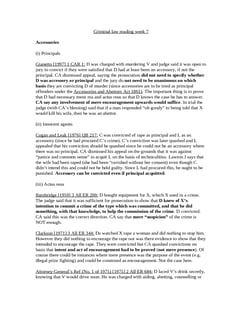Judgement for the case Beckford v R
Table Of Contents
KEY POINTS
The defendant, a police officer, took the life of a man, believing he posed a serious threat as a dangerous gunman firing at the police. The defence asserted self-defence, and the jury focused on evaluating whether the defendant's actions were justified based on the reasonableness of their belief in the necessity to resist an imminent attack.
A significant aspect of the trial procedure under scrutiny was determining whether the jury misdirection occurred.
The correct test for self-defense should be based on the defendant's honest belief in the necessity to resist an attack.
FACTS
The defendant, a police officer, faced charges of murder. According to the prosecution, the defendant and another armed officer pursued an unarmed individual, shooting him and causing his death. The prosecution argued that the fatal shooting occurred when the deceased had his hands raised and was pleading with them not to shoot.
In the defendant's statement from the dock, he claimed that he and other armed officers had been dispatched to investigate a report that the deceased was a dangerous gunman terrorizing someone at a house. Upon arrival, the defendant alleged seeing the deceased running away with what appeared to be a gun. The defendant asserted that, during the pursuit, he observed the deceased firing at them, prompting the officers to return fire, resulting in the death of the deceased.
During the trial, the judge, about self-defense, directed the jury that a person attacked in circumstances where they reasonably believed their life to be in danger or that they were at risk of serious bodily injury and could use the force necessary to resist the attack. If, in using such force, the assailant was killed, the individual would not be guilty of any crime. Despite this, the defendant was convicted of murder and sentenced to death.
The Court of Appeal of Jamaica dismissed the defendant's appeal against conviction, affirming that the jury had been properly directed concerning self-defense.
JUDGEMENT
The appeal was allowed, holding that the common law of England was applicable in Jamaica to determine whether the defendant had acted in self-defense. The prosecution was obligated to prove that the violence used by the defendant was unlawful.
Therefore, if the defendant honestly believed the circumstances justified the use of force to defend himself or another from an attack, and the force used was no more than reasonable to resist the attack, he was entitled to an acquittal of murder.
This was because the intent to act unlawfully would be negatived by his belief, regardless of its mistaken or unreasonable nature. However, the reasonableness of the alleged belief was material in establishing its genuineness.
The trial judge had misdirected the jury on self-defense.
Given the capital nature of the offense, it could not be conclusively determined that a properly directed jury would have returned the same verdict. Hence, the proviso to section 14(1) of the Judicature (Appellate Jurisdiction) Act could not be applied, and the conviction was quashed.
COMMENTARY
In this case, the prosecution argued that the officer and a colleague had fatally shot an unarmed man despite his hands raised and pleas not to be shot. The defendant claimed self-defense, citing a response to a report of the deceased being a dangerous gunman. According to the officer, the deceased seemed armed, prompting a pursuit where the deceased allegedly fired at them. The ensuing return of fire resulted in the deceased's death.
-
The judge instructed the jury on self-defense during the trial, stating that if a person reasonably believed their life or another's was in danger and used force no more than necessary to resist the attack, resulting in the assailant's death, they were not guilty of any crime.
However, the defendant was convicted of murder and sentenced to death.
The Court of Appeal in Jamaica upheld the conviction, asserting proper jury direction on self-defense.
On appeal to the Judicial Committee, it was held that the common law of England applied, and the prosecution had to prove the unlawfulness of the defendant's violence.
Acknowledging the trial judge's misdirection on self-defense, the conviction was quashed under the Judicature (Appellate Jurisdiction) Act, as it couldn't be conclusively determined that a properly directed jury would have returned the same verdict.
ORIGINAL ANALYSIS
In Jamaica a policeman shot an unarmed man in the honest belief that the man had a gun was going to shoot him.
The Jamaican trial judge and Jamaican CA held that the policeman’s belief had to be reasonable and therefore he was convicted of murder. The HL said that actually no “reasonableness” requirement existed and that provided the belief was genuine and honest then it was a defence. Naturally, how reasonable of far-fetched the belief was could be used as evidence to deduce whether it was likely that Defendant actually held the belief.
In this case HL quashed the conviction.
R v Williams (Gladstone) and R v Morgan clearly establish the lack of need for reasonableness.
RELATED CASES
For Further Study on Beckford v R
Need instant answers? Our AI exam tutor is here to help.
Ask questions 🙋 Get answers 📔 It's simple 👁️👄👁️
Our AI is educated by the highest scoring students across all subjects and schools. Join hundreds of your peers today.
Get StartedRelated Product Samples
These product samples contain the same concepts we cover in this case.
| Criminal Law | Defences Notes (32 pages) |
| Criminal Law | Defences Short Notes (28 pages) |
| Criminal Law | Homicide Notes (20 pages) |

 Since 2010, Oxbridge Notes has been a trusted education marketplace, supplying high-quality materials from top achievers at universities like Oxford, Cambridge, LSE, Harvard, and Yale.
Since 2010, Oxbridge Notes has been a trusted education marketplace, supplying high-quality materials from top achievers at universities like Oxford, Cambridge, LSE, Harvard, and Yale.